修辞学分析肯尼迪演说
- 格式:doc
- 大小:29.00 KB
- 文档页数:2
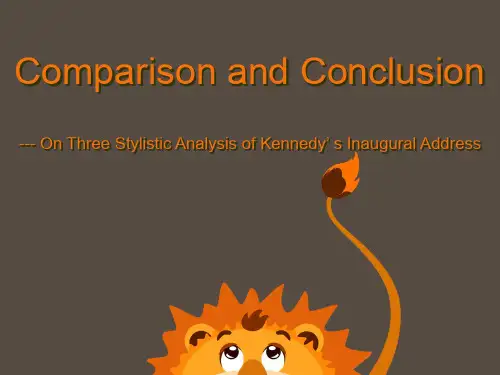
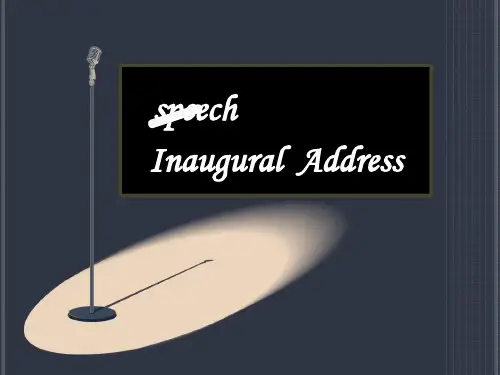
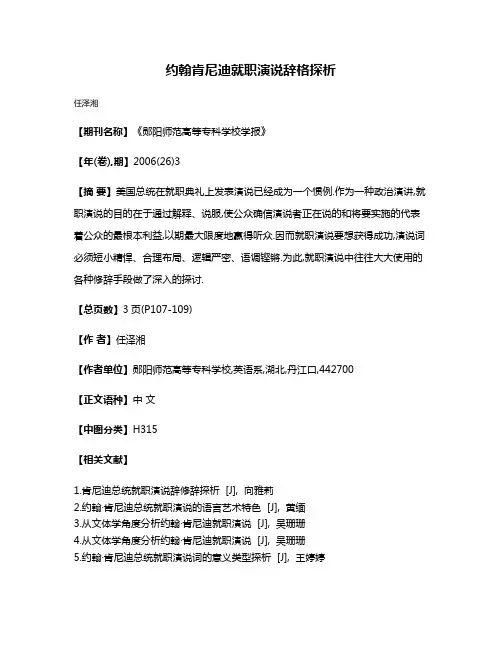
约翰肯尼迪就职演说辞格探析
任泽湘
【期刊名称】《郧阳师范高等专科学校学报》
【年(卷),期】2006(26)3
【摘要】美国总统在就职典礼上发表演说已经成为一个惯例.作为一种政治演讲,就职演说的目的在于通过解释、说服,使公众确信演说者正在说的和将要实施的代表着公众的最根本利益,以期最大限度地赢得听众.因而就职演说要想获得成功,演说词必须短小精悍、合理布局、逻辑严密、语调铿锵.为此,就职演说中往往大大使用的各种修辞手段做了深入的探讨.
【总页数】3页(P107-109)
【作者】任泽湘
【作者单位】郧阳师范高等专科学校,英语系,湖北,丹江口,442700
【正文语种】中文
【中图分类】H315
【相关文献】
1.肯尼迪总统就职演说辞修辞探析 [J], 向雅莉
2.约翰·肯尼迪总统就职演说的语言艺术特色 [J], 黄缅
3.从文体学角度分析约翰·肯尼迪就职演说 [J], 吴珊珊
4.从文体学角度分析约翰·肯尼迪就职演说 [J], 吴珊珊
5.约翰·肯尼迪总统就职演说词的意义类型探析 [J], 王婷婷
因版权原因,仅展示原文概要,查看原文内容请购买。
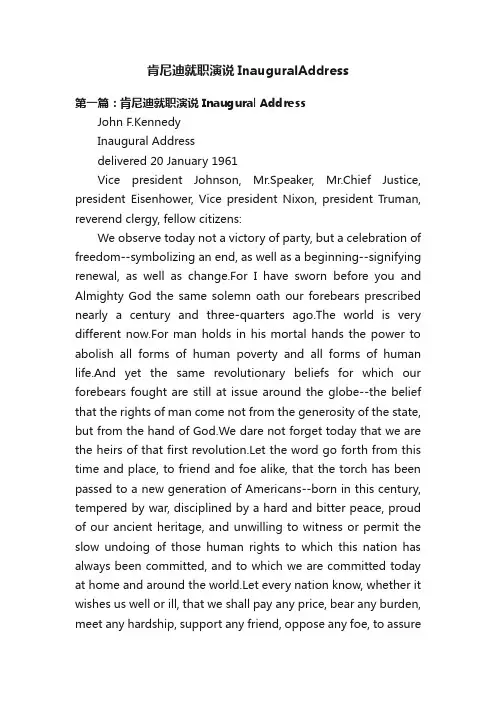
肯尼迪就职演说InauguralAddress第一篇:肯尼迪就职演说 Inaugural AddressJohn F.KennedyInaugural Addressdelivered 20 January 1961Vice president Johnson, Mr.Speaker, Mr.Chief Justice, president Eisenhower, Vice president Nixon, president Truman, reverend clergy, fellow citizens:We observe today not a victory of party, but a celebration of freedom--symbolizing an end, as well as a beginning--signifying renewal, as well as change.For I have sworn before you and Almighty God the same solemn oath our forebears prescribed nearly a century and three-quarters ago.The world is very different now.For man holds in his mortal hands the power to abolish all forms of human poverty and all forms of human life.And yet the same revolutionary beliefs for which our forebears fought are still at issue around the globe--the belief that the rights of man come not from the generosity of the state, but from the hand of God.We dare not forget today that we are the heirs of that first revolution.Let the word go forth from this time and place, to friend and foe alike, that the torch has been passed to a new generation of Americans--born in this century, tempered by war, disciplined by a hard and bitter peace, proud of our ancient heritage, and unwilling to witness or permit the slow undoing of those human rights to which this nation has always been committed, and to which we are committed today at home and around the world.Let every nation know, whether it wishes us well or ill, that we shall pay any price, bear any burden, meet any hardship, support any friend, oppose any foe, to assurethe survival and the success of liberty.This much we pledge--and more.To those old allies whose cultural and spiritual origins we share, we pledge the loyalty of faithful friends.United there is little we cannot do in a host of cooperative ventures.Divided there is little we can do--for we dare not meet a powerful challenge at odds and split asunder.T o those new states whom we welcome to the ranks of the free, we pledge our word that one form of colonial control shall not have passed away merely to be replaced by a far more iron tyranny.We shall not always expect to find them supporting our view.But we shall always hope to find them strongly supporting their own freedom--and to remember that, in the past, those who foolishly sought power by riding the back of the tiger ended up inside.To those people in the huts and villages of half the globe struggling to break the bonds of mass misery, we pledge our best efforts to help them help themselves, for whatever period is required--not because the Communists may be doing it, not because we seek their votes, but because it is right.If a free society cannot help the many who are poor, it cannot save the few who are rich.T o our sister republics south of our border, we offer a special pledge: to convert our good words into good deeds, in a new alliance for progress, to assist free men and free governments in casting off the chains of poverty.But this peaceful revolution of hope cannot become the prey of hostile powers.Let all our neighbors know that we shall join with them to oppose aggression or subversion anywhere in the Americas.And let every other power know that this hemisphere intends to remain the master of its own house.To that world assembly of sovereign states, the United Nations, our last best hope in an age where the instruments of war have far outpaced the instruments of peace, we renew our pledge ofsupport--to prevent it from becoming merely a forum for invective, to strengthen its shield of the new and the weak, and to enlarge the area in which its writ may run.Finally, to those nations who would make themselves our adversary, we offer not a pledge but a request: that both sides begin anew the quest for peace, before the dark powers of destruction unleashed by science engulf all humanity in planned or accidental self-destruction.We dare not tempt them with weakness.For only when our arms are sufficient beyond doubt can we be certain beyond doubt that they will never be employed.But neither can two great and powerful groups of nations take comfort from our present course--both sides overburdened by the cost of modern weapons, both rightly alarmed by the steady spread of the deadly atom, yet both racing to alter that uncertain balance of terror that stays the hand of mankind's final war.So let us begin anew--remembering on both sides that civility is not a sign of weakness, and sincerity is always subject to proof.Let us never negotiate out of fear, but let us never fear to negotiate.Let both sides explore what problems unite us instead of belaboring those problems which divide us.Let both sides, for the first time, formulate serious and precise proposals for the inspection and control of arms, and bring the absolute power to destroy other nations under the absolute control of all nations.Let both sides seek to invoke the wonders of science instead of its terrors.Together let us explore the stars, conquer the deserts, eradicate disease, tap the ocean depths, and encourage the arts and commerce.Let both sides unite to heed, in all corners of the earth, the command of Isaiah--to “undo the heavy burdens, and [to] let the oppressed go free.”¹And, if a beachhead of cooperation may push back the jungleof suspicion, let both sides join in creating a new endeavor--not a new balance of power, but a new world of law--where the strong are just, and the weak secure, and the peace preserved.All this will not be finished in the first one hundred days.Nor will it be finished in the first one thousand days;nor in the life of this Administration;nor even perhaps in our lifetime on this planet.But let us begin.In your hands, my fellow citizens, more than mine, will rest the final success or failure of our course.Since this country was founded, each generation of Americans has been summoned to give testimony to its national loyalty.The graves of young Americans who answered the call to service surround the globe.Now the trumpet summons us again--not as a call to bear arms, though arms we need--not as a call to battle, though embattled we are--but a call to bear the burden of a long twilight struggle, year in and year out, “rejoicing in hope;patient in tribulation,”² a struggle against the common enemies of man: tyranny, poverty, disease, and war itself.Can we forge against these enemies a grand and global alliance, North and South, East and West, that can assure a more fruitful life for all mankind? Will you join in that historic effort?In the long history of the world, only a few generations have been granted the role of defending freedom in its hour of maximum danger.I do not shrink from this responsibility--I welcome it.I do not believe that any of us would exchange places with any other people or any other generation.The energy, the faith, the devotion which we bring to this endeavor will light our country and all who serve it.And the glow from that fire can truly light the world.And so, my fellow Americans, ask not what your country can do for you;ask what you can do for your country.My fellow citizens of the world, ask not what America will do for you,but what together we can do for the freedom of man.Finally, whether you are citizens of America or citizens of the world, ask of us here the same high standards of strength and sacrifice which we ask of you.With a good conscience our only sure reward, with history the final judge of our deeds, let us go forth to lead the land we love, asking His blessing and His help, but knowing that here on earth God's work must truly be our own.第二篇:肯尼迪就职演说Inaugural Address(January 20,1961)By John F.Kennedy We observe today not a victory of party but a celebration of freedom, symbolizing an end as well as a beginning, signifying renewal as well as change.For I have sworn before you and Almighty God the same solemn oath our forebears prescribed nearly a century and three-quarters ago.The world is very different now.For man holds in his mortal hands the power to abolish all forms of human poverty and all forms of human life.And yet the same revolutionary belief for which our forebears fought is still at issue around the globe, the belief that the rights of man come not from the generosity of the state but from the hand of God.We dare not forget today that we are the heirs of that first revolution.Let the word go forth from this time and place, to friend and foe alike, that the torch has been passed to a new generation of Americans, born in this century, tempered by war, disciplined by a hard and bitter peace, proud of our ancient heritage, and unwilling to witness or permit the slow undoing of these human rights to which this nation has always been committed, and to which we are committed today at home and around the world.Let every nation know, whether it wishes us well or ill, that we shall pay any price, bear any burden, meet any hardship, support any friend, oppose any foe to assure the survival and the success ofliberty.This much we pledge—and more.To those old allies whose cultural and spiritual origins we share, we pledge the loyalty of faithful friends.United, there is little we cannot do in a host of co-operative ventures.Divided, there is little we can do, for we dare not meet a powerful challenge at odds and split asunder.To those new states whom we welcome to the ranks of the free, we pledge our word that one form of colonial control shall not have passed away merely to be replaced by a far more iron tyranny.We shall not always expect to find them supporting our view.But we shall always hope to find them strongly supporting their own freedom, and to remember that, in the past, those who foolishly sought power by riding the back of the tiger ended up inside.T o those peoples in the huts and villages of half the globe struggling to break the bonds of mass misery, we pledge our best efforts to help them help themselves, for whatever period is required, not because the Communists may be doing it, not because we seek their votes, but because it is right.If a free society cannot help the many who are poor, it cannot save the few who are rich.T o our sister republics south of our border, we offer a special pledge: to convert our good words into good deeds, in a new alliance for progress, to assist free men and free governments in casting off the chains of poverty.But this peaceful revolution of hope cannot become the prey of hostile powers.Let all our neighbors know that we shall join with them to oppose aggression or subversion anywhere in the Americas.And let every other power know that this hemisphere intends to remain the master of its own house.To that world assembly of sovereign states, the United Nations, our last best hope in an age where the instruments of war have far outpaced the instruments of peace, we renew our pledge of support to prevent it from becoming merely a forum for invective,to strengthen its shield of the new and the weak, and to enlarge the area in which its writ may run.Finally, to those nations who would make themselves our adversary, we offer not a pledge but a request: that both sides begin anew the quest for peace, before the dark powers of destruction unleashed by science engulf all humanity in planned or accidental self-destruction.讲评“肯尼迪总统就职演说词” ■北京外国语大学李品伟选评美国总统就职演说词独具一格,而肯尼迪的讲演更是其中一篇为人们注目的代表作,字字句句经过刻意雕琢,有许多值得品味推敲之处。
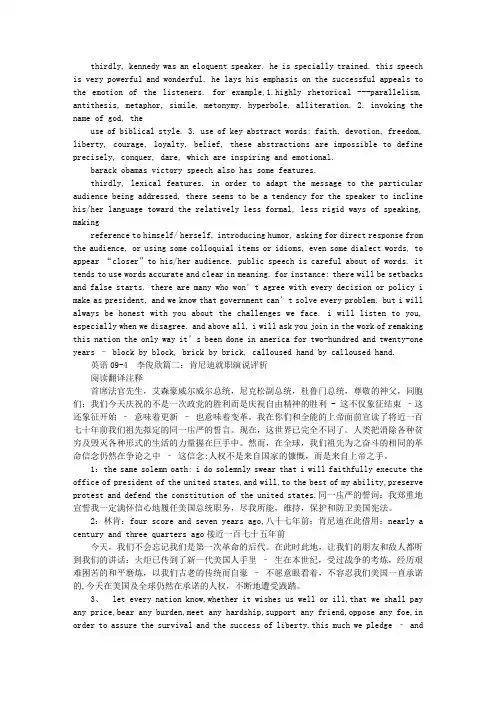
thirdly, kennedy was an eloquent speaker. he is specially trained. this speechis very powerful and wonderful. he lays his emphasis on the successful appeals tothe emotion of the listeners. for example,1.highly rhetorical ---parallelism,antithesis, metaphor, simile, metonymy, hyperbole, alliteration. 2. invoking thename of god, the use of biblical style. 3. use of key abstract words: faith, devotion, freedom,liberty, courage, loyalty, belief, these abstractions are impossible to defineprecisely, conquer, dare, which are inspiring and emotional. barack obamas victory speech also has some features. thirdly, lexical features. in order to adapt the message to the particularaudience being addressed, there seems to be a tendency for the speaker to inclinehis/her language toward the relatively less formal, less rigid ways of speaking,making reference to himself/ herself, introducing humor, asking for direct response fromthe audience, or using some colloquial items or idioms, even some dialect words, toappear “closer”to his/her audience. public speech is careful about of words. ittends to use words accurate and clear in meaning. for instance: there will be setbacksand false starts. there are many who won’t agree with every decision or policy imake as president, and we know that government can’t solve every problem. but i willalways be honest with you about the challenges we face. i will listen to you,especially when we disagree. and above all, i will ask you join in the work of remakingthis nation the only way it’s been done in america for two-hundred and twenty-oneyears – block by block, brick by brick, calloused hand by calloused hand.英语09-4 李俊欣篇二:肯尼迪就职演说评析阅读翻译注释首席法官先生,艾森豪威尔威尔总统,尼克松副总统,杜鲁门总统,尊敬的神父,同胞们;我们今天庆祝的不是一次政党的胜利而是庆祝自由精神的胜利 - 这不仅象征结束–这还象征开始–意味着更新–也意味着变革。
![肯尼迪的演讲特点[精选合集]](https://uimg.taocdn.com/2d2cb3429a6648d7c1c708a1284ac850ac020472.webp)
肯尼迪的演讲特点[精选合集]第一篇:肯尼迪的演讲特点肯尼迪的演讲特点文体学是一门运用现代语言学理论和方法研究文体的学科。
文体分析不仅能够帮助我们深入领会文本的意义,而且可以为我们挖掘文本的美学价值提供比较客观的依据(秦秀白:2002:6)。
美国总统就职演说是就职典礼的重要组成部分,在就职演说中,总统们宣布自己的施政纲领,并劝说公众接受并支持它们。
就职演说影响广泛,意义深远,而且是发表在白宫新主人首次“公开亮相”的场合,每篇演说都事先经过了认真地准备,不仅展现了各位总统的个人风采,而且多数都堪称文中精品,具有相当的审美情趣。
约翰·菲茨杰拉德·肯尼迪是美国第35届总统。
任内实施“新边疆”构想,振兴美国经济,全力维护美国的世界霸主地位,展示了其卓越的政治才华。
而他的演讲口才也不同凡响,他的演讲技巧在1961年的就职演说中被发挥得淋漓尽致。
此演说言辞华美,气势雄伟,极富感染力,一直被认为是一篇演讲中的经典之作。
本论文将从文体学的角度对该演说进行分析,揭示其文体特征。
以帮助大家更好地欣赏肯尼迪的演讲艺术,并学习一些演讲中的语言技巧,提高演讲水平。
一、词汇层面肯尼迪演讲辞的总词汇量为1342个,其中六个字母以上的单词有349个,占总数的26%。
接近于美国总统就职演说辞中六字母以上词的平均含词量:27·7%。
英语中六个字母以上或三个音节以上的词常被看着大词。
这些词往往来自于拉丁语,希腊语或法语,或者有着复杂的内部结构。
大词在正式书面体中出现较多。
在日常谈话,即席解说,甚至广告中,六个字母以上词的百分比都没有超过20%。
因此,肯尼迪的就职演说具有较明显的书面语特征,这是由总统就职演说的内容,功能,发表场合,及发表方式所决定的。
总统就职演说的内容涉及政治,发表场合较严肃,可以事先准备,避免了口语体的随意性。
就职演说属于鼓动性的语言,演讲者常常借助词汇手段达到自己的鼓动效果。
形容词就是这样一种有效手段。
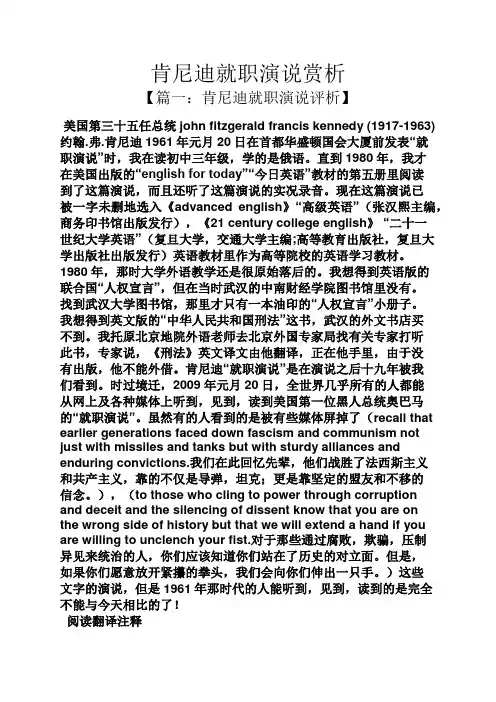
肯尼迪就职演说赏析【篇一:肯尼迪就职演说评析】美国第三十五任总统john fitzgerald francis kennedy (1917-1963)约翰.弗.肯尼迪1961年元月20日在首都华盛顿国会大厦前发表“就职演说”时,我在读初中三年级,学的是俄语。
直到1980年,我才在美国出版的“english for today”“今日英语”教材的第五册里阅读到了这篇演说,而且还听了这篇演说的实况录音。
现在这篇演说已被一字未删地选入《advanced english》“高级英语”(张汉熙主编,商务印书馆出版发行),《21 century college english》“二十一世纪大学英语”(复旦大学,交通大学主编;高等教育出版社,复旦大学出版社出版发行)英语教材里作为高等院校的英语学习教材。
1980年,那时大学外语教学还是很原始落后的。
我想得到英语版的联合国“人权宣言”,但在当时武汉的中南财经学院图书馆里没有。
找到武汉大学图书馆,那里才只有一本油印的“人权宣言”小册子。
我想得到英文版的“中华人民共和国刑法”这书,武汉的外文书店买不到。
我托原北京地院外语老师去北京外国专家局找有关专家打听此书,专家说,《刑法》英文译文由他翻译,正在他手里,由于没有出版,他不能外借。
肯尼迪“就职演说”是在演说之后十九年被我们看到。
时过境迁,2009年元月20日,全世界几乎所有的人都能从网上及各种媒体上听到,见到,读到美国第一位黑人总统奥巴马的“就职演说”。
虽然有的人看到的是被有些媒体屏掉了(recall that earlier generations faced down fascism and communism notjust with missiles and tanks but with sturdy alliances and enduring convictions.我们在此回忆先辈,他们战胜了法西斯主义和共产主义,靠的不仅是导弹,坦克;更是靠坚定的盟友和不移的信念。
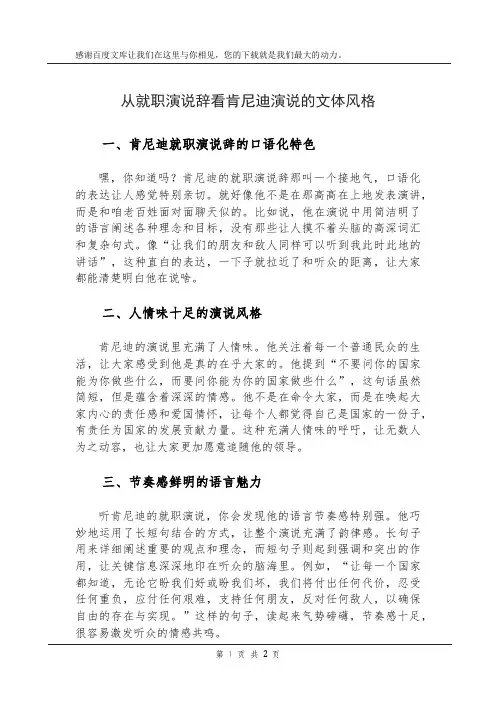
从就职演说辞看肯尼迪演说的文体风格一、肯尼迪就职演说辞的口语化特色嘿,你知道吗?肯尼迪的就职演说辞那叫一个接地气,口语化的表达让人感觉特别亲切。
就好像他不是在那高高在上地发表演讲,而是和咱老百姓面对面聊天似的。
比如说,他在演说中用简洁明了的语言阐述各种理念和目标,没有那些让人摸不着头脑的高深词汇和复杂句式。
像“让我们的朋友和敌人同样可以听到我此时此地的讲话”,这种直白的表达,一下子就拉近了和听众的距离,让大家都能清楚明白他在说啥。
二、人情味十足的演说风格肯尼迪的演说里充满了人情味。
他关注着每一个普通民众的生活,让大家感受到他是真的在乎大家的。
他提到“不要问你的国家能为你做些什么,而要问你能为你的国家做些什么”,这句话虽然简短,但是蕴含着深深的情感。
他不是在命令大家,而是在唤起大家内心的责任感和爱国情怀,让每个人都觉得自己是国家的一份子,有责任为国家的发展贡献力量。
这种充满人情味的呼吁,让无数人为之动容,也让大家更加愿意追随他的领导。
三、节奏感鲜明的语言魅力听肯尼迪的就职演说,你会发现他的语言节奏感特别强。
他巧妙地运用了长短句结合的方式,让整个演说充满了韵律感。
长句子用来详细阐述重要的观点和理念,而短句子则起到强调和突出的作用,让关键信息深深地印在听众的脑海里。
例如,“让每一个国家都知道,无论它盼我们好或盼我们坏,我们将付出任何代价,忍受任何重负,应付任何艰难,支持任何朋友,反对任何敌人,以确保自由的存在与实现。
”这样的句子,读起来气势磅礴,节奏感十足,很容易激发听众的情感共鸣。
四、生动描绘与细节丰富的表达肯尼迪在演说中特别擅长生动描绘和展现丰富的细节。
他不会只是干巴巴地说一些空洞的大道理,而是通过具体的事例和细节来支撑自己的观点。
比如,他在谈到国际形势的时候,会详细描述当时世界面临的各种挑战和危机,让听众能够真切地感受到局势的严峻。
这种生动描绘和细节丰富的表达,让演说更加具有说服力和感染力,让听众能够更加深刻地理解他想要传达的信息。
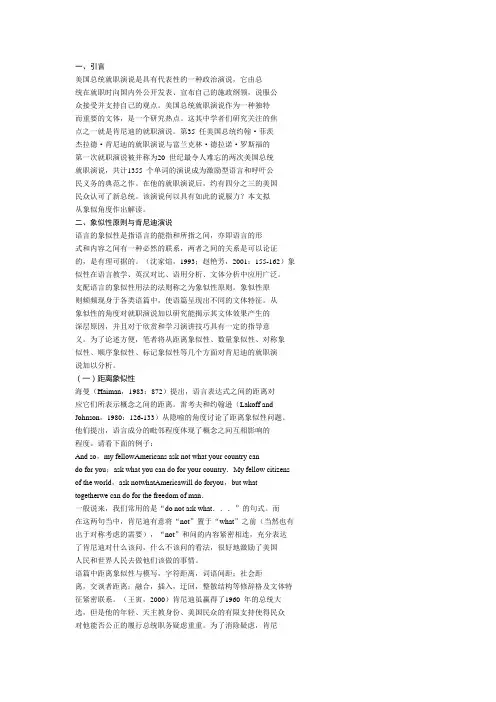
一、引言美国总统就职演说是具有代表性的一种政治演说,它由总统在就职时向国内外公开发表、宣布自己的施政纲领,说服公众接受并支持自己的观点。
美国总统就职演说作为一种独特而重要的文体,是一个研究热点。
这其中学者们研究关注的焦点之一就是肯尼迪的就职演说。
第35 任美国总统约翰·菲茨杰拉德·肯尼迪的就职演说与富兰克林·德拉诺·罗斯福的第一次就职演说被并称为20 世纪最令人难忘的两次美国总统就职演说,共计1355 个单词的演说成为激励型语言和呼吁公民义务的典范之作。
在他的就职演说后,约有四分之三的美国民众认可了新总统。
该演说何以具有如此的说服力?本文拟从象似角度作出解读。
二、象似性原则与肯尼迪演说语言的象似性是指语言的能指和所指之间,亦即语言的形式和内容之间有一种必然的联系,两者之间的关系是可以论证的,是有理可据的。
(沈家煊,1993;赵艳芳,2001:155-162)象似性在语言教学、英汉对比、语用分析、文体分析中应用广泛。
支配语言的象似性用法的法则称之为象似性原则。
象似性原则频频现身于各类语篇中,使语篇呈现出不同的文体特征。
从象似性的角度对就职演说加以研究能揭示其文体效果产生的深层原因,并且对于欣赏和学习演讲技巧具有一定的指导意义。
为了论述方便,笔者将从距离象似性、数量象似性、对称象似性、顺序象似性、标记象似性等几个方面对肯尼迪的就职演说加以分析。
(一)距离象似性海曼(Haiman,1983:872)提出,语言表达式之间的距离对应它们所表示概念之间的距离。
雷考夫和约翰逊(Lakoff and Johnson,1980:126-133)从隐喻的角度讨论了距离象似性问题。
他们提出,语言成分的毗邻程度体现了概念之间互相影响的程度。
请看下面的例子:And so,my fellowAmericans ask not what your country cando for you;ask what you can do for your country.My fellow citizens of the world,ask notwhatAmericawill do foryou,but what togetherwe can do for the freedom of man.一般说来,我们常用的是“do not ask what...”的句式。
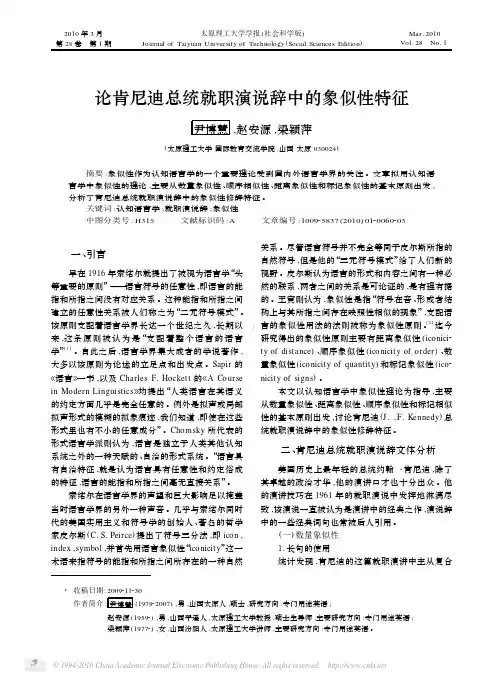
2010年3月第28卷 第1期 太原理工大学学报(社会科学版)Journal of Taiyuan University of Technology(Social Sciences Edition) Mar.2010 Vol.28 No.1论肯尼迪总统就职演说辞中的象似性特征尹博慧,赵安源,梁颖萍(太原理工大学国际教育交流学院,山西太原030024) 摘要:象似性作为认知语言学的一个重要理论受到国内外语言学界的关注。
文章拟用认知语言学中象似性的理论,主要从数量象似性、顺序相似性、距离象似性和标记象似性的基本原则出发,分析了肯尼迪总统就职演说辞中的象似性修辞特征。
关键词:认知语言学;就职演说辞;象似性中图分类号:H315 文献标识码:A 文章编号:100925837(2010)0120060203 一、引言早在1916年索绪尔就提出了被视为语言学“头等重要的原则”———语言符号的任意性,即语言的能指和所指之间没有对应关系。
这种能指和所指之间建立的任意性关系被人们称之为“二元符号模式”。
该原则支配着语言学界长达一个世纪之久,长期以来,这条原则被认为是“支配着整个语言的语言学”[1]。
自此之后,语言学界集大成者的学说著作,大多以该原则为论述的立足点和出发点。
Sapir的《语言》一书,以及Charles F.Hockett的《A Course in Modern Linguistics》均提出“人类语言在其语义的约定方面几乎是完全任意的。
例外是拟声或局部拟声形式的模糊的拟象痕迹,我们知道,即使在这些形式里也有不小的任意成分”。
Chomsky所代表的形式语言学派则认为,语言是独立于人类其他认知系统之外的一种天赋的、自治的形式系统。
“语言具有自治特征,就是认为语言具有任意性和约定俗成的特征,语言的能指和所指之间毫无直接关系”。
索绪尔在语言学界的声望和巨大影响足以掩盖当时语言学界的另外一种声音。
几乎与索绪尔同时代的美国实用主义和符号学的创始人、著名的哲学家皮尔斯(C.S.Peirce)提出了符号三分法,即icon, index,symbol,并首先用语言象似性“iconicity”这一术语来指符号的能指和所指之间所存在的一种自然关系。
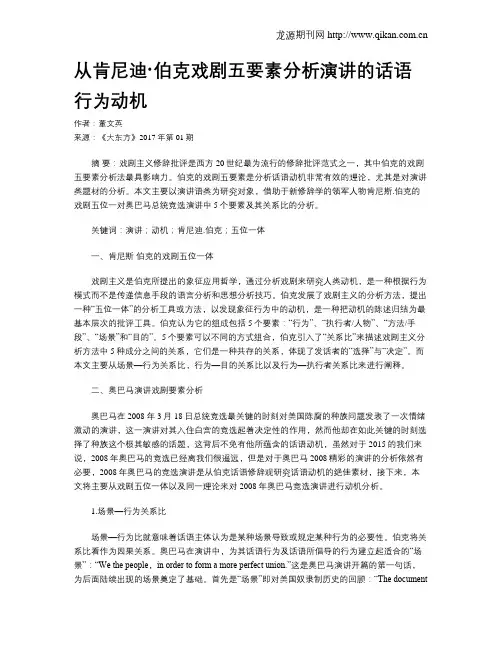
从肯尼迪·伯克戏剧五要素分析演讲的话语行为动机作者:董文英来源:《大东方》2017年第01期摘要:戏剧主义修辞批评是西方20世纪最为流行的修辞批评范式之一,其中伯克的戏剧五要素分析法最具影响力。
伯克的戏剧五要素是分析话语动机非常有效的理论,尤其是对演讲类题材的分析。
本文主要以演讲语类为研究对象,借助于新修辞学的领军人物肯尼斯.伯克的戏剧五位一对奥巴马总统竞选演讲中5个要素及其关系比的分析。
关键词:演讲;动机;肯尼迪.伯克;五位一体一、肯尼斯伯克的戏剧五位一体戏剧主义是伯克所提出的象征应用哲学,通过分析戏剧来研究人类动机,是一种根据行为模式而不是传递信息手段的语言分析和思想分析技巧。
伯克发展了戏剧主义的分析方法,提出一种“五位一体”的分析工具或方法,以发现象征行为中的动机,是一种把动机的陈述归结为最基本层次的批评工具。
伯克认为它的组成包括5个要素:“行为”、“执行者/人物”、“方法/手段”、“场景”和“目的”。
5个要素可以不同的方式组合,伯克引入了“关系比”来描述戏剧主义分析方法中5种成分之间的关系,它们是一种共存的关系,体现了发话者的“选择”与“决定”。
而本文主要从场景—行为关系比,行为—目的关系比以及行为—执行者关系比来进行阐释。
二、奥巴马演讲戏剧要素分析奥巴马在2008年3月18日总统竞选最关键的时刻对美国陈腐的种族问题发表了一次情绪激动的演讲,这一演讲对其入住白宫的竞选起着决定性的作用,然而他却在如此关键的时刻选择了种族这个极其敏感的话题,这背后不免有他所蕴含的话语动机,虽然对于2015的我们来说,2008年奥巴马的竞选已经离我们很遥远,但是对于奥巴马2008精彩的演讲的分析依然有必要,2008年奥巴马的竞选演讲是从伯克话语修辞观研究话语动机的绝佳素材,接下来,本文将主要从戏剧五位一体以及同一理论来对2008年奥巴马竞选演讲进行动机分析。
1.场景—行为关系比场景—行为比就意味着话语主体认为是某种场景导致或规定某种行为的必要性。
具有鼓舞人心特点的约翰肯尼迪的演讲稿很多人对约翰肯尼迪的演讲都会有深刻印象,因为他的演讲充满了鼓舞人心的特点。
他的演讲给人们带来了自信和勇气,不仅针对美国国内的问题,也提醒了世界的其他国家和领导人们。
让我们一起回顾肯尼迪总统的演讲,探讨他的演讲是如何影响了人们。
肯尼迪总统的演讲在20世纪60年代左右,正值美国发生一些关键性的变化。
当时美国社会面临着一系列的问题,例如种族歧视、经济不景气、国际形势紧张等等。
在这个关键的时刻,肯尼迪总统的演讲让人们看到了希望和未来。
他的演讲鼓舞了人们的士气,引领着美国走向了一个新的时代。
肯尼迪总统在他的演讲中,以极具魅力的口吻和令人难以忘怀的语调,表达了他对美国这个伟大国家的深情热爱。
他的演讲在时代的洪流中格外亮眼,无论是在纸上阅读还是在演讲现场,肯尼迪总统的演讲充满了感性的情感和精神的力量。
肯尼迪总统在他的演讲中,讲述了美国的理念和愿景,用语言上升到了更高的关注层面,而不是过度关注局部的问题。
他在演讲中不仅指出了社会面临的问题,但更重要的是,他激励着人们对问题,追求公正和正确的义务所做的行为。
肯尼迪总统的演讲强调了需要克服困难和面对挑战的勇气。
特别是在20世纪60年代的美国,人们希望有为这个伟大国家的未来出一份力,更希望有一个可以指导美国获得成功和和谐的领导者。
肯尼迪总统的演讲中提出了“不要问国家能为你做些什么,而要问你能为国家做些什么”的著名论点,这不仅鼓励了美国人民积极参与建设国家的行动,更启示了朝向更广泛的社会义务和责任来帮助世界。
肯尼迪总统的演讲通过满热情的语言,在心理和情感上对美国人民产生了很大的影响。
其演讲中的语言表达紧扣观众的心弦,激励了整个国家团结在一起,共同努力,使美国成为全球最强大和成功的国家之一。
最终,约翰肯尼迪的演讲作为历史的见证,是其人生中最重要的部分之一。
他的演讲可以总结为鼓励人们在面对挑战时保持勇气和坚韧,勉励人们在一切挑战和困境中追求正确和公正的道路,最终让美国走向一个更加美好的未来。
从就职演说辞看肯尼迪演说的文体风格熊莉(湖北民族学院外国语学院,湖北恩施445000)摘要:肯尼迪的总统就职演说辞一直被认为是一篇演讲中的经典之作。
本论文从文体学的角度,在词法、句法、修辞、语篇等各个层面,对肯尼迪的就职演说辞进行分析,揭示其文体特征,以帮助大家更好地欣赏肯尼迪的演讲艺术,并学习一些演讲中的语言技巧,提高演讲水平。
关键词:就职演说辞;文体分析;修辞手段文体学是一门运用现代语言学理论和方法研究文体的学科。
文体分析不仅能够帮助我们深入领会文本的意义,而且可以为我们挖掘文本的美学价值提供比较客观的依据(秦秀白, 2002: 6) 。
美国总统就职演说是就职典礼的重要组成部分,在就职演说中,总统们宣布自己的施政纲领,并劝说公众接受并支持它们。
就职演说影响广泛,意义深远,而且是发表在白宫主人首次“公开亮相”的场合,每篇演说都事先经过了认真地准备,不仅展现了各位总统的个人风采,而且多数都堪称文中精品,具有相当的审美价值。
约翰·菲茨杰拉德·肯尼迪是美国第35届总统。
任内实施“新边疆”构想,振兴美国经济,全力维护美国的世界霸主地位,展示了其卓越的政治才华。
而他的演讲口才也不同凡响,他的演讲技巧在1961年的就职演说中被发挥得淋漓尽致。
此演说言辞华美,气势雄伟,极富感染力,一直被认为是一篇演讲中的经典之作。
本论文将从文体学的角度对该演说进行分析,揭示其文体特征。
以帮助大家更好地欣赏肯尼迪的演讲艺术,并学习一些演讲中的语言技巧,提高演讲水平。
一、词汇层面肯尼迪演讲辞的总词汇量为1342 个,其中六个字母以上的单词有349 个,占总数的26 %。
接近于美国总统就职演说辞中六字母以上词的平均含词量:27.7 %。
英语中六个字母以上或三个音节以上的词常被看着大词。
这些词往往来自于拉丁语、希腊语或法语,或者有着复杂的内部结构。
大词在正式书面体中出现较多。
在日常谈话、即席解说,甚至广告中, 六个字母以上词的百分比都没有超过20%。
Course 修辞学
Inaugural Address
--A Rhetorical Analysis of John F. Kennedy’s speech The Inaugural Address delivered by John F. Kennedy is regarded as one of the best inaugural addresses in America. In this address, he had to make great effort to persuade the public to accept and support his policies. To achieve this effect, lots of language skills had to be applier for.
At the Level of Lexis
(1) From the beginning of this speech, “my fellow citizens”, “we observe today…”we can find that throughout this speech, John F. Kennedy used the first person, let audiences stand in the same point, felt comfortable to accept his speech and evoke an echo.
(2) The appliance of metaphor adds more color to the speech. For instance, “torch”in paragraph 3 indicates American’s belief of equality and freedom; “sister republics”in paragraph 9 shows intimate relationship; “dark powers” in paragraph 11 implies the power of nuclear weapon. The figurative uses of language make this speech appeal to audience’s imaginatio n and provoke their reflection.
(3) This is an inaugural address, so it has to be effective. The diction in this speech should be appropriate, vivid and sensitive. Throughout this speech, there are many formal words, for example “observe”, “symbolize”, “signify”, “abolish”, “temper”, “discipline”, “pledge”, “invective”, “summon”, “forge”, etc. This kind of diction distributed in his speech because of the solemn circumstance. His speech is not wordy which could cause sound effect. He measured the verbs and adjectives carefully to make sure the diction is to be exact.
Choice of sentences
As we all know, there are four basic sentence types—simple sentences, compound sentences, complex sentences, compound-complex sentences. However, using too many long and complex sentences will make audience confused. Also, too many short and simple sentences may cause negative effects. In this speech, John F. Kennedy changed sentence types orderly and try to balance the two side effects. What’s more, imperative sentences are widely used like “Let us…” they give rise to resonance and increase speaker’s tone.
Syntactic patterns
(1) Parallelism: Proper use of parallelism could produce balance and rhythm to the speech. Therefore, it may leave deep impression to audience. For example, for sentences, from paragraph 6 to paragraph 11, at the beginning of each paragraph, there are “to those old allies”, “to those people”, “to our sister republics”, “to that world assembly”, “to those nations”; from paragraph 5 to paragraph18, all start with “let both side”. For words, like “the energy, the faith, the devotion which bring to this endeavor”; for phrases, like “born in this century, tempered by war, disciplined by…”All these parallel structure led to powerful result and enhance sound effect.
(2) Antithesis: The appliance of antithesis express contrasting ideas in parallel phrases or clauses to create a dramatic effect. It essentially makes the original subject seem more important. At the beginning of the speech, “We observe today not as a victory of party, but a celebration of freedom—symbolizing an end as well as a beginning—signifying renewal as well as change.” Here, the three different contract, show that America has demolished the old and bring forth the new. Antitheses together with parallelism put emphasis on the structure and fill the sentence with emotions. Besides, Kennedy used a lot of antithesis sentences to catch people’s attention. Such as “united…divided…” in paragraph 6; “Let us never negotiate out of fear, but let us never fear to negotiate”in paragraph 14 and “Ask not what your country can do for you—ask what you can do for your country” in paragraph 25, etc.
(3) Alliteration: Alliteration often produces some aesthetic appeal and helps readers to remember. In this address, there are also some appliances of alliteration. For instance, “p.ay any p.rice”, “b.ear any b.urden”, “f.riends and f.oe”, “the s.urvival and the s.uccess of liberty”, “w.ishes us w.ell or ill” in paragraph 4.
In conclusion, all the above analyze the rhetorical device used in lexis and syntax. President John F. Kennedy made a successful inaugural address, which has profound effect in history. The language skills in this speech are excellently applied. In a word, it is a great classic in all the Inaugural Addresses.。